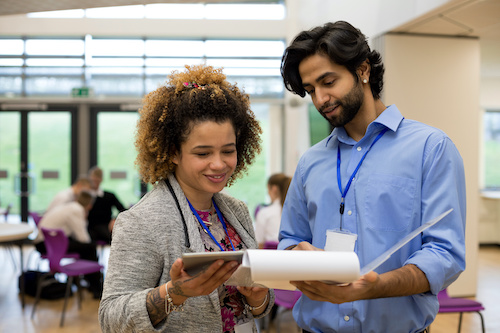Key points:
- It’s time to stop fearing AI and welcome the potential it has for student success
- See also: Empowering educators through holistic teacher PD
- See also: Teacher Q&A: Strengthening PD with AI
- For more news on teacher PD, visit eSN’s Educational Leadership page
Last fall, ChatGPT, an AI-powered language model, became the subject of widespread discussion, from lighthearted memes about robots taking over to genuine confusion about the capabilities and implications of AI. While we have come to understand this technology better, there still remains hesitancy and caution surrounding AI and its integration into education. A prime example was the New York City School System, which had prohibited students and teachers from accessing ChatGPT’s website on school computers.
This hesitation is understandable, as any new technology brings about both excitement and trepidation. However, it is essential for educators and instructional coaches to embrace emerging technologies like AI, as doing otherwise would mean doing our students a disservice. By integrating AI into the classroom, we have the opportunity to enhance teaching practices, coaching conversations, and ultimately support student success in innovative and meaningful ways.
AI in instructional coaching: Analyzing practices and breaking down conversations
AI, and specifically generative AI tools, are revolutionizing instructional coaching by providing powerful insights and analysis into teaching practices. These tools can analyze coaching conversations, identify patterns, and offer targeted recommendations for improvement. With the assistance of AI, instructional coaches can gain a deeper understanding of effective teaching techniques and those that may need refinement.
Generative AI tools can also help coaches break down coaching conversations and highlight essential points that may have been missed during the session. These tools can transcribe and analyze coaching conversations in real time, providing coaches with valuable data and insights into the teacher’s instructional strategies, student engagement, and areas for growth.
Moreover, AI is not limited to analyzing coaching conversations alone. It can also process a wide range of data, including instructional materials, student work, and assessment results, to offer evidence-based insights. This wealth of information equips instructional coaches with a holistic view of the classroom environment, enabling them to provide targeted support and guidance to teachers.
Beyond generative AI: Exploring the full potential of emerging AI technologies
While generative AI tools have shown tremendous potential in instructional coaching, it is important to recognize that they are just one piece of the puzzle. The field of AI is rapidly evolving, and educators should explore various emerging AI technologies to amplify the impact of instructional coaching.
For instance, machine learning algorithms can help identify teaching practices that lead to improved student outcomes by analyzing large datasets and pinpointing effective strategies. Natural language processing (NLP) enables coaches to analyze student feedback and identify trends or areas of concern. Computer vision technologies can revolutionize classroom observations by automating the process and providing objective insights.
Additionally, AI-powered recommendation systems can suggest personalized professional development resources for teachers based on their specific needs and areas of growth. Virtual reality and augmented reality can create immersive learning experiences, enabling teachers to explore innovative pedagogical approaches and enhance student engagement.
By harnessing the power of these emerging AI technologies, instructional coaches can perform their jobs more efficiently and effectively. They can focus their efforts on targeted interventions, provide timely feedback, and support teachers in adopting evidence-based practices.
AI technologies in instructional coaching: No longer an option but a necessity
Incorporating emerging AI technologies in instructional coaching is no longer an option but a necessity. The hesitancy around AI and new technologies is understandable, but it is crucial to recognize the immense potential they hold for enhancing teaching practices, breaking down coaching conversations, and ultimately supporting student success.
Generative AI tools, alongside other emerging AI technologies like machine learning, computer vision, and recommendation systems, offer powerful insights and analysis that can transform instructional coaching. By embracing these technologies and leveraging their capabilities, instructional coaches can provide personalized guidance, target areas for improvement, and help teachers create meaningful learning experiences for their students.
As AI continues to evolve, it is imperative for educators and instructional coaches to stay curious, informed, and adaptable. By embracing the possibilities that AI offers in education, we can pave the way for more effective instructional coaching and ensure that our students thrive in a rapidly changing world.
- 4 ways to encourage play in education - April 25, 2024
- CoSN IT Leader Spotlight: Lisa Higgins - April 25, 2024
- It’s time to pay student teachers - April 25, 2024

